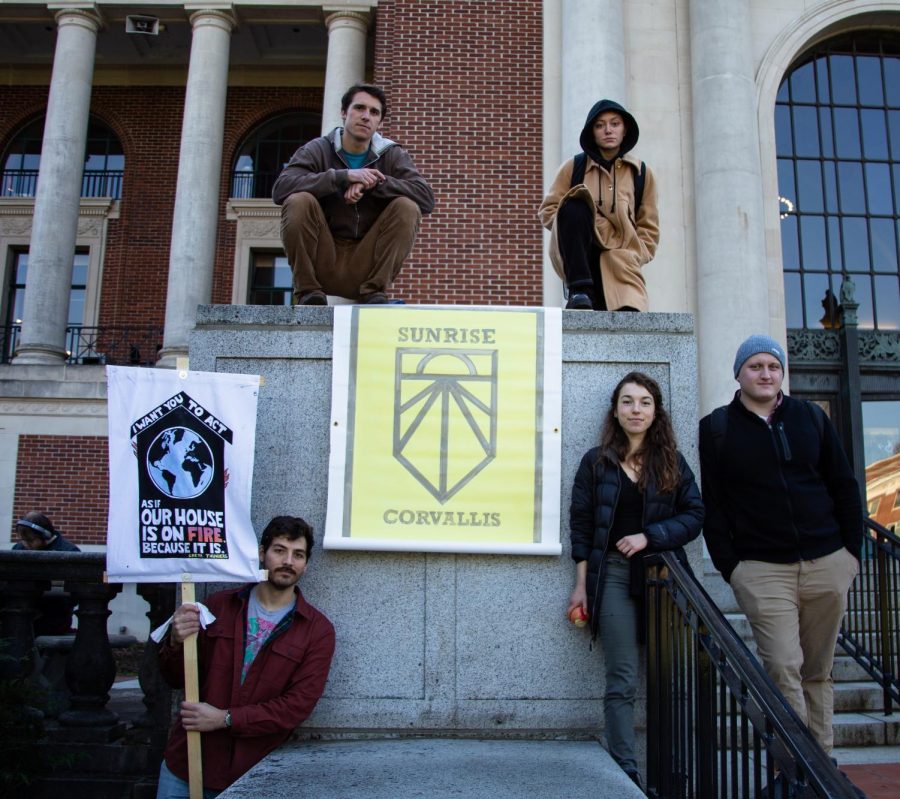Sunrise Movement aims to show support for “meaningful, positive change in climate-related issues”
November 25, 2019
Correction: This article previously misspelled Kalapuya. This issue has been resolved. The Barometer regrets the error.
If you walk by the Memorial Union footsteps from noon to 1 p.m. on a Friday, chances are, you might catch the sight of a group of people holding yellow banners and peacefully protesting for climate change.
They call themselves Sunrise, and they are the Corvallis hub of the national Sunrise Movement.
Sunrise is a newer climate action group within the city, only being formed last year. During this past summer, Sunrise members worked with the larger organization of the Corvallis Climate Action Alliance to help prepare the city of Corvallis for the Global Climate Strike Week, which took place from Sept. 20-27.
Willem Klajbor, an Oregon State University graduate student studying marine resource management, said Sunrise is organized by a committee of people—there is no one president or supervisor—the group meets together to discuss action and direction, trying to use the input of as many people possible.
Klajbor said Sunrise’s Friday sit-ins at OSU are inspired by the “Friday’s for the Future” sit-ins, which are spearheaded by youth climate activist, Greta Thunberg.
“We’re not trying to protest a specific policy; what we are trying to do is show that there is support for meaningful, positive change in climate-related issues—whether that be on campus, in the city of Corvallis, or within the state of Oregon,” Klajbor said.
According to Klajbor, while the sit-ins do not protest one specific policy, the group does advocate for specific policies and actions through other activities.
Philosophy major and third-year student, Jessica Thompson, found out about Sunrise through her original involvement with the Corvallis Climate Action Alliance. Thompson joined Sunrise on Sept. 20, the beginning of Global Climate Strike Week.
“I have this pre-anxious thing, where I am just concerned for the future of our planet. I don’t want to sit here and be hopeless—I want to do something about it, and I want to make my voice heard,” Thompson said. “When Greta Thunberg announced Global Climate Strike Week, I immediately knew the city of Corvallis was going to have some big ordeal, and therefore I wanted to step in and get involved.
Thompson said ways to help alleviate climate change can be attained through more education and promotion. Habits like recycling, eating less meat and being more conscious about the things you are consuming are really important.
Rachael Aber, an OSU graduate student studying integrative biology, joined the Corvallis Sunrise hub after hearing about the national movement.
“Climate change is important to me because it threatens our way of life and everything that is built upon it: our economy, our livelihoods and our families,” Aber said. “I believe it is largely ignored and swept under the rug; people have the awareness, but the policy changes and actions are not there.”
All three students stressed the importance of OSU fulfilling its promise to be carbon neutral by 2025. Both Klajbor and Aber said that students should be actively following up with OSU on their promise of carbon neutrality within the next six years.
Klajbor also suggested the possibility of making sustainability curriculum a requirement at OSU.
“One way to increase awareness is by making sustainability curriculum a requirement at places like OSU. I think there’s been small pushes for that in the past, but requiring students to take some sort of sustainability class would go a long way in making people actually care about what’s going on,” Klajbor said.
On a positive note, Klajbor said one good thing many major universities are doing is divesting endowment from holdings in companies that actively invest in fossil fuels. However, at OSU, the company that manages the university’s endowment is private—it’s not publicly owned, as is the case in other universities.
“Here at OSU, all our endowment funds are owned by a private company whose only interest is increasing profits. It’s really difficult to get them to even listen to ideas about divesting from those lucrative, but ultimately destructive investments,” Klajbor said.
Thompson said she believes it is very important for students to know that OSU is built on Kalapuya land. Students should also know about the hardships that the Siletz Reservation faces–they don’t have access to clean water or arable land.
“We should learn about indigenous people, acknowledge them and get more inclined to be involved in their practices. This is really important because indigenous people have a great respect for their land–living in harmony within it and dwelling in its beauty. I think west-centric ideals have really lost touch with that,” Thompson said.















































































































